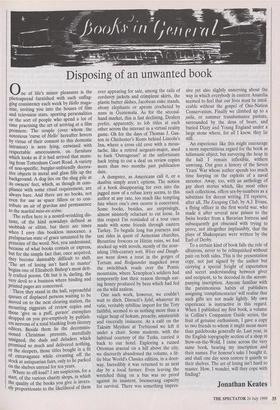Disposing of an unwanted book
Printed pages are concerned. ing honey produced by bees which had fed There they stand in the hall, reproachful on the wild azaleas. queues of displaced persons waiting to be One such work, however, we couldn't moved on to the next clearing station, the wait to ditch. Disraeli's Sybil, whatever its mounting ziggurats of review copies and vatic, veritably sybilline import for the Tory those 'give us a puff, guvnor' exemplars faithful, seemed to us nothing more than a dropped on you pre-emptively by publish- vulgar heap of hokum, preachy, amateurish ers nervous of a total blanking from literary and viscerally insincere. At a café on the editors. Beside them lie the decommis- Taksim Meydani at Trebizond we left it sinned Christmas presents, mercifully under a chair. Some students, with the unsigned, the duds and deluders which habitual courtesy of the Turks, carried it promised so much and delivered nothing, back to our hotel. Exploring a ruined or the sleepers, those titles bought in a fit Ottoman arsenal on a hill above the city, of extravagance while creaming off the we discreetly abandoned the volume, a lit- stock at antiquarian fairs, only to lie parked tle blue World's Classics edition, in a door- on the shelves unread for ten years. way. Incredibly it was returned to us next Where to off-load? I am suspicious, for a day by a local farmer. Even leaving the start, of the various charity shops, in which wretched thing on a bus was no proof the quality of the books you give is rovers- against its insistent, boomerang capacity ely proportionate to the likelihood of them for survival. There was something impres- sive yet also slightly unnerving about the way in which everybody in eastern Anatolia seemed to feel that our lives must be intol- erable without the gospel of One-Nation Conservatism. Finally we climbed up to a yaila, or summer transhumance pasture, surrounded by the dens of bears, and buried Dizzy and Young England under a large stone where, for all I know, they lie still.
An experience like this might encourage a more superstitious regard for the book as talismanic object, but surveying the heap in the hall I remain inflexible, withers unwrung. Out goes a history of the Seven Years' War whose author spends too much time harping on the exploits of a naval ancestor. Away, too, with an anthology of gay short stories which, like most other such collections, offers sex-by-numbers as a substitute for decent writing. I'll reprieve, after all, The Escaping Club, by A.J. Evans, a flying officer in the first world war, who made it after several near misses to the Swiss border from a Bavarian fortress and subsequently got obsessed with trying to prove, not altogether implausibly, that the plays of Shakespeare were written by the Earl of Derby.
To a certain kind of book falls the role of albatross, never to be relinquished without pain on both sides. This is the presentation copy, not just signed by the author but carrying a special freight of expectation and secret understanding between giver and recipient, to be decoded in the accom- panying inscription. Anyone familiar with the parsimonious habits of publishers assigning `complimentaries' will realise that such gifts are not made lightly. My own experience is instructive in this regard. When I published my first book, a volume in Collins's Companion Guide series, the fruit of genuine enthusiasm, I gave a copy to two friends to whom it might mean more than guidebooks generally do. Last year, in the English topography section of a shop in Stow-on-the-Wold, I came across the very same book, bearing my inscription and their names. For honour's sake I bought it, and shall one day soon restore it quietly to their shelves. The art of losing isn't hard to master. How, I wondei, will they cope with finding?
Jonathan Keates


























































 Previous page
Previous page